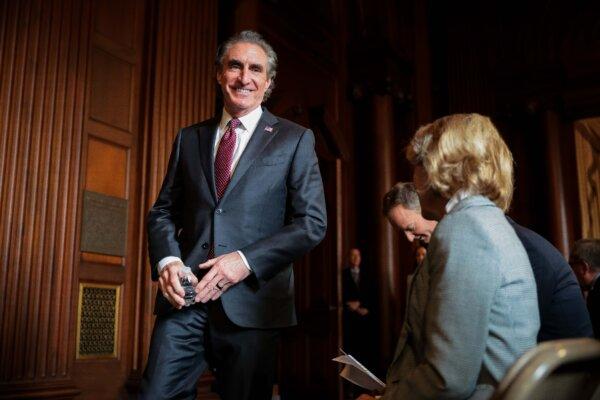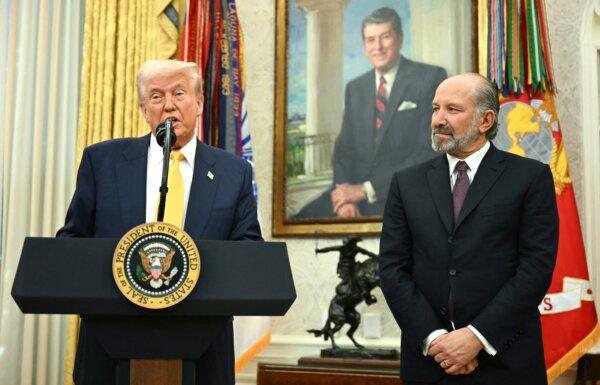Trump’s Directives to Enhance Logging and Lumber Production Spark Mixed Reactions
A lumber industry supporter commends the ‘pragmatic directives.’ An environmental organization views it as a ‘chainsaw free-for-all.’
On March 1, President Donald Trump issued two executive orders aimed at boosting domestic timber and lumber production, garnering both accolades and backlash.
Commenting primarily on the first order, Blaine Miller-McFeeley from Earthjustice, a nonprofit environmental law firm, stated on March 1 that this administration is initiating “a chainsaw free-for-all on our federal forests.”
Miller-McFeeley further asserted that the order “aims to weaken the Endangered Species Act… the most effective tool for ensuring the survival of endangered species and addressing the biodiversity crisis.”
Meanwhile, Travis Joseph, President of the American Forest Resource Council (AFRC), expressed support for the executive orders.
According to AFRC’s website, it is a regional trade association advocating for sustainable timber harvests on public lands throughout the West to improve forest health and resilience against fire, pests, and diseases.
“Our federal forests have suffered from mismanagement for decades,” Joseph commented. “Americans have borne the consequences in numerous ways: lost jobs, diminished manufacturing, and infrastructure. Reduced recreational opportunities such as hunting and fishing, along with restricted access to our lands. Degraded wildlife populations, water quality, and air. Landscapes and communities devastated by wildfires.
“Our federal forests are in a state of emergency. It’s high time we treat them as such and take prompt action,” Joseph added.
Concerns Over National Security
Trump stated in his order deregulating the timber sector that increasing lumber production would “safeguard our national and economic security.”
The abundance of American timber is “more than sufficient” to fulfill the nation’s requirements, he asserted.
Trump attributed what he termed as “overbearing federal policies” for hindering the complete utilization of the United States’ timber resources and for making the country “dependent on foreign suppliers.”
“It is crucial that we reverse these policies,” the president remarked.

Interior Secretary Doug Burgum takes his seat before a water policy announcement at the Environmental Protection Agency on Feb. 18, 2025, in Washington.Kayla Bartkowski/Getty Images
In his order concerning national security, Trump mentioned that the country “faces significant vulnerabilities in the wood supply chain due to imported timber, lumber, and their derivative products being flooded into the [domestic] market.”
“The wood products industry, which encompasses timber, lumber, and their derivative goods (such as paper products, furniture, and cabinetry) is a vital manufacturing sector crucial to the national security, economic stability, and industrial resilience of the United States,” stated the order. “This industry plays an essential role in key downstream civilian sectors, including construction.”
The order also indicated that the U.S. military spends over $10 billion annually on construction, with the procurement of these essential materials reliant on a strong domestic lumber sector and a manufacturing foundation capable of addressing both military-specific and broader civilian demands.
Trump has directed Commerce Secretary Howard Lutnick to assess the national security impacts of timber, lumber, and their derivative imports. Lutnick is also responsible for evaluating the capacity of domestic production to meet demand.
Moreover, Lutnick is tasked with examining the influence of foreign exporters on the U.S. timber and lumber markets and the effects of foreign government subsidies and predatory trade practices on U.S. companies.
The commerce secretary will also explore trade policies to ascertain whether quotas and tariffs might be necessary to safeguard national security, while consulting with the Secretary of Defense about the risks associated with timber and lumber imports.

President Donald Trump speaks during a ceremonial swearing-in for Secretary of Commerce Howard Lutnick in the Oval Office on Feb. 21, 2025.Jim Watson/AFP via Getty Images
Immediate Actions
Trump’s initial order mandates agencies to eliminate “all unnecessary delays in their respective permitting processes concerning timber production.”
Furthermore, Trump has instructed Interior Secretary Doug Burgum and the Bureau of Land Management director, alongside Agriculture Secretary Brooke Rollins and the head of the U.S. Forest Service, to provide guidance within 30 days on how to boost timber production, reduce delivery times, minimize supply uncertainties, and promote responsible forest management.
Within 60 days, Burgum and the U.S. Fish and Wildlife Service director, along with Lutnick and the assistant administrator for fisheries, are required to formulate a plan aimed at accelerating project approvals influenced by the Endangered Species Act.
Burgum, serving as chair of the Endangered Species Committee, is tasked with ensuring a timely review of all applications submitted to the committee and resolving exemption requests ahead of the deadlines established by the Endangered Species Act.




